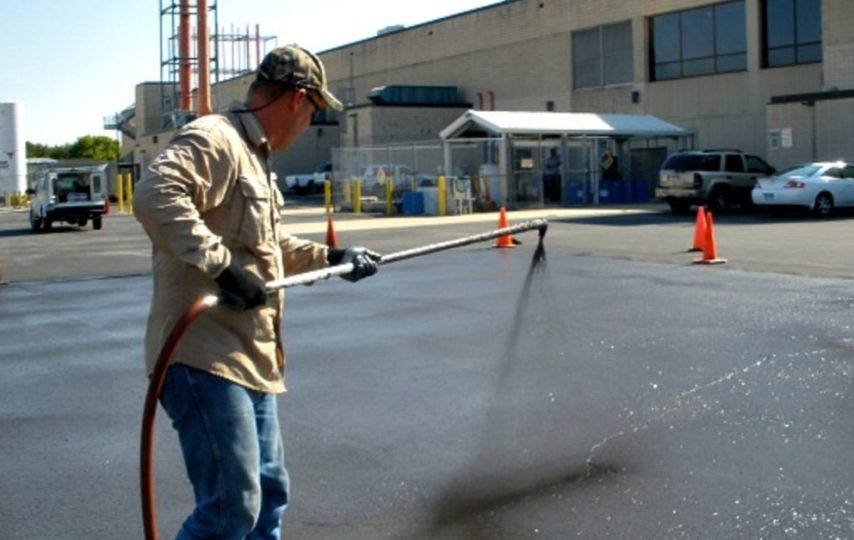According to the United States Geological Survey (USGS), asphalt sealcoating is a serious health hazard. This is because asphalt increases the risk of exposure to polycyclic aromatic hydrocarbons (PAHs), which are known to cause cancer. Apart from being hazardous, sealcoating is also unnecessary, because we have better options that help to preserve the appearance and finish of your driveway or parking lot.
Typically, the sealcoating process involves the spraying of coal-tar pitch mixture over an existing asphalt surface, and this is mostly done for cosmetic purposes. Rarely does sealcoating help to improve the integrity of your asphalt. Further, sealcoating wears down within two years after its application, and it creates fine particles, which can get into your business or home, become airborne, and finally get embedded in your lungs.
Research conducted by USGS and researchers from Baylor University found that people living next to pavements sealed with coal tar have an increased risk of cancer. Further, the study revealed that the risk is even higher for younger children.
Most asphalt contractors provide coal-tar pitch sealcoating, but their clients don’t understand the risks. Although the product will give your driveway or parking lot a smooth and deep black appearance, it’s only for a short time. Unlike other sealcoating options that can last for more than 10 years, coal-tar pitch sealcoating doesn’t last more than two years before foot traffic and tires wear it off.
The major concerns with coal-tar pitch sealcoating
As indicated earlier, coal-tar based asphalt sealants contain high levels of Polycyclic Aromatic Hydrocarbons (PAHs). Polycyclic Aromatic Hydrocarbons (PAHs) are a major concern because they increase the risk of cancer, birth defects, and mutations. Also, PAHs are harmful to the environment, as well as wildlife. Moreover, exposing coal-tar based sealants to sunlight increases the strength of several PAHs.
Environmental problems
Studies have revealed that PAHs can still be found in most water sources, even long after a sealcoating project is done. Moreover, the studies show that the exposure of high concentrations of Polycyclic Aromatic Hydrocarbons can cause death to certain aquatic species, like Coho salmon and fathead minnows.
Because of the health and environmental concerns, certain cities across the United States have banned the use of coal tar-based asphalt sealants. Interestingly, the results of such measures seem to be working. In 2006, Austin was the first city in the United States to ban the use of these products. And, by 2014, the levels of PAH pollutants in the Lady Bird Lake, in Colorado River, which is in Austin had reduced by 50%–that’s according to the USGS.
Other cities and counties in the U.S. have also enacted similar bans and instituted enforcement actions for anyone who violates these rules. For instance, anyone who violates these rules in Austin is required to clean the contamination caused by the products, and they can face serious fines or jail time.
Are there better alternatives to coal-tar based asphalt sealants?
The experienced professionals from ABС Paving, a sealcoating contractor from Florida say that asphalt-based sealants are the best substitute to coal-tar based sealants. While asphalt-based sealants are not 100% PAH-free, they have around 1,000 x lower concentration than coal-tar based sealants.
Most asphalt contractors in the United States have stopped dealing with coal tar-based sealants. All-in-all, you should avoid using coal tar-based products when sealcoating your driveway or parking lot. This calls you people to do the due diligence when choosing an asphalt sealing contractor, and check whether or not they deal with such products.
Also, you can consider alternatives to asphalt-paved surfaces, like permeable paver, permeable asphalt, or concrete. These alternatives don’t require regular sealcoating as part of their maintenance. Moreover, permeable asphalt and permeable pavers have an additional benefit of absorbing and filtering rainwater, which helps to reduce the levels of PAHs that might be present in runoff water.
Resurfacing your surface is an efficient, greener, and durable option than sealcoating. During an asphalt resurfacing project, the top-layer of an asphalt-paved surface is recycled, and then a fresh 1.5” – 2” layer of fresh asphalt is laid down. As a result, your asphalt surface gets the desired smooth and black finish, and the entire project releases less Polycyclic Aromatic Hydrocarbons than sealcoating.
If you are seeking a Leadership in Energy & Environmental Design (LEED) certification during your renovation project, consider resurfacing, instead of sealcoating.
Some of the benefits that you get to enjoy from resurfacing include:
- Lower costs and reduced maintenance
- Durability
- Conservation of the environment
- Recycling of waste meant for landfills
- Reduced greenhouse gas emissions
Resurfacing your parking lot or driveway makes it more durable than sealcoating. Typically, resurfacing involves the application of a thick and fresh layer of asphalt, which is then tamped down. That leads to a completely new and flat surface. At the end of the day, resurfacing improves drainage and reduces vehicle damage because of bad roads.













